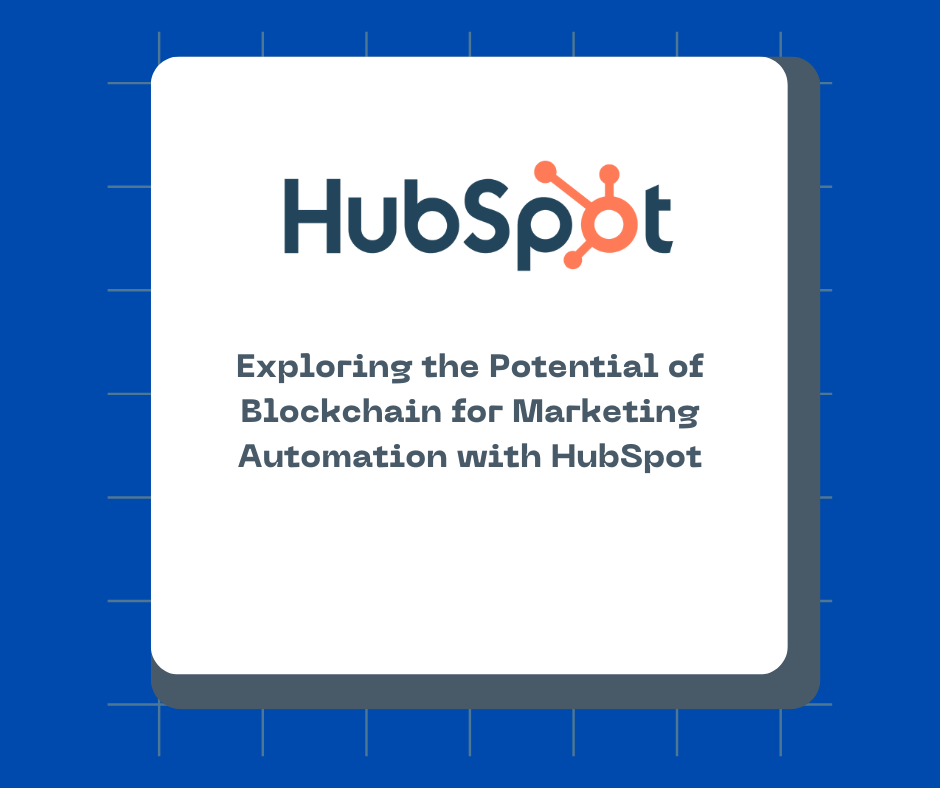In the realm of marketing, staying ahead of the curve often means embracing cutting-edge technologies that can revolutionize the way businesses engage with their customers. Blockchain, once synonymous solely with cryptocurrencies, has now expanded its reach into various industries, including marketing. By providing a decentralized and secure framework for transactions and data exchange, blockchain has the potential to transform marketing automation, making processes more transparent, efficient, and trustworthy. In this article, we'll delve into the exciting intersection of blockchain and marketing automation, exploring how businesses can harness the potential of blockchain technology with HubSpot.
Understanding Blockchain and Its Impact on Marketing: Blockchain, at its core, is a decentralized and immutable ledger that records transactions across a network of computers. Each transaction, or block, is encrypted and linked to the previous one, creating a chain of blocks that is resistant to tampering and fraud. This inherent security and transparency make blockchain an attractive solution for various industries, including marketing.
In the context of marketing automation, blockchain technology can address several key challenges:
-
Data Security and Privacy: One of the most significant concerns in marketing automation is the security and privacy of customer data. With traditional centralized systems, data breaches and unauthorized access are constant threats. Blockchain offers a decentralized approach to data storage, where each participant in the network retains control over their data. This ensures that sensitive customer information remains secure and private, reducing the risk of data breaches and compliance violations.
-
Trust and Transparency: Trust is paramount in marketing, particularly when it comes to verifying the authenticity of transactions and interactions. Blockchain's transparent and immutable ledger provides a verifiable record of every transaction, eliminating the need for intermediaries and reducing the risk of fraud. This increased transparency fosters trust between businesses and their customers, enhancing brand credibility and loyalty.
-
Smart Contracts and Automation: Smart contracts, self-executing contracts with the terms of the agreement directly written into code, enable automated and secure transactions on the blockchain. In the context of marketing automation, smart contracts can streamline processes such as payment settlements, affiliate marketing, and loyalty programs. By automating these processes with smart contracts, businesses can reduce administrative overhead, minimize disputes, and improve efficiency.
Leveraging HubSpot for Blockchain-Powered Marketing Automation: HubSpot, a leading provider of marketing automation software, offers a range of tools and features that can be integrated with blockchain technology to enhance security, transparency, and automation in marketing processes. Here's how businesses can leverage HubSpot for blockchain-powered marketing automation:
-
Secure Data Storage and Authentication: HubSpot's CRM platform serves as a centralized repository for customer data, interactions, and preferences. By integrating blockchain technology with HubSpot's CRM, businesses can enhance data security and authentication, ensuring that customer information remains protected against unauthorized access and tampering. Blockchain-based authentication mechanisms can verify the integrity of customer data, enhancing trust and compliance with privacy regulations such as GDPR.
-
Transparent Attribution and Analytics: Tracking the effectiveness of marketing campaigns and attributing conversions accurately is crucial for optimizing marketing strategies and maximizing ROI. Blockchain's transparent ledger provides a tamper-proof record of customer interactions and transactions, enabling transparent attribution and analytics. By integrating blockchain with HubSpot's reporting and analytics tools, businesses can gain deeper insights into customer behavior, campaign performance, and ROI, driving data-driven decision-making and optimization.
-
Decentralized Loyalty Programs: Loyalty programs are a powerful tool for driving customer retention and engagement. By leveraging blockchain technology, businesses can create decentralized loyalty programs that offer greater transparency, flexibility, and security. Smart contracts can automate the issuance and redemption of loyalty points, ensuring that rewards are distributed fairly and transparently. Integration with HubSpot's marketing automation tools enables businesses to personalize loyalty program interactions based on customer preferences and behavior, driving greater engagement and loyalty.
-
Enhanced Supply Chain Transparency: Blockchain technology can revolutionize supply chain management by providing transparency and traceability across the entire value chain. By integrating blockchain with HubSpot's marketing automation platform, businesses can communicate their commitment to transparency and sustainability to customers. Blockchain-enabled product authentication and verification mechanisms can assure customers of the authenticity and origin of products, enhancing brand trust and loyalty.
Real-World Applications and Success Stories: Several businesses and industries are already leveraging blockchain technology in conjunction with marketing automation to drive innovation and achieve business objectives:
-
Retail Industry: Retailers are exploring blockchain-powered solutions to enhance supply chain transparency, combat counterfeiting, and improve customer trust. By integrating blockchain with marketing automation platforms like HubSpot, retailers can create seamless and personalized shopping experiences while ensuring the authenticity and integrity of products.
-
Financial Services: Financial institutions are adopting blockchain technology to streamline processes such as identity verification, Know Your Customer (KYC) compliance, and cross-border payments. By integrating blockchain with marketing automation, banks and fintech companies can enhance customer onboarding experiences, automate regulatory compliance processes, and deliver personalized financial services to customers.
Conclusion: As blockchain technology continues to evolve and mature, its integration with marketing automation platforms like HubSpot offers unprecedented opportunities for businesses to enhance security, transparency, and efficiency in marketing processes. By leveraging blockchain-powered solutions, businesses can build trust with customers, improve data security and privacy, and unlock new avenues for innovation and growth. As the adoption of blockchain technology accelerates, businesses that embrace this transformative technology will be well-positioned to thrive in an increasingly digital and decentralized marketplace.
Schedule your training session here and comment “Need Training” on the request form.

Comments